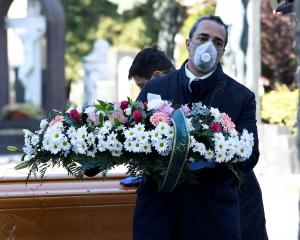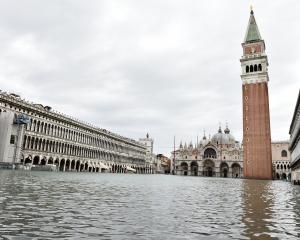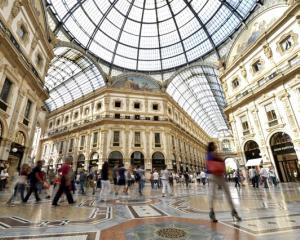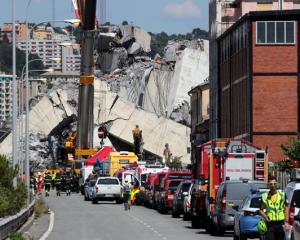
Mayor Luigi Brugnaro closed access to the submerged St. Mark's Square and issued an international appeal for funds, warning that the damage caused by this week's floods could rise to one billion euros.
Local authorities said the high tide peaked at 154cm , slightly below expectations and significantly lower than the 187 cm level reached on Tuesday, which was the second highest tide ever recorded in Venice.
But it was still enough to leave 70% of the city under water, fraying the nerves of locals who faced yet another large-scale clean-up operation.
"We have been in this emergency for days and we just can't put up with it any more," said Venetian resident Nava Naccara.
The government declared a state of emergency for Venice on Thursday, allocating 20 million euros ($22 million) to address the immediate damage, but Brugnaro predicted the costs would be vastly higher and launched a fund to help pay for repairs.
"Venice was destroyed the other day. We are talking about damage totalling a billion euros," he said in a video.
Sirens wailed across the city from the early morning hours, warning of the impending high tide. Sea water swiftly filled the crypt beneath St. Mark's Basilica, built more than a thousand years ago.

Culture Minister Dario Franceschini said initial checks suggested the damage to St. Mark's was not irreparable, but warned that more than 50 churches across the city had been flooded this week.
"Visiting here you see that the disaster is much bigger than you think when you watch the images on television," he said.
CLIMATE CHANGE
After Friday's high waters, forecasters predicted tides of up to 110-120 cm during the weekend. In normal conditions, tides of 80-90cm are generally seen as high but manageable.
The mayor has blamed climate change for the ever-increasing flood waters that the city has had to deal with in recent years, with the mean sea level estimated to be more than 20 cm higher than it was a century ago, and set to raise much further.
Groups of volunteers and students arrived in the city centre to help businesses mop up, while schools remained closed, as they have been most of the week.
"When you hear the name Venice, it is always like sunsets and everything pretty but it is a bit crazy now that we are here," said British tourist Chelsea Smart. "I knew it was going to flood ... but I didn't expect it to be this high."
At the city's internationally renowned bookshop Acqua Alta -- the Italian for high water -- staff were trying to dry out thousands of water-damaged books and prints, usually kept in boats, bath tubs and plastic bins.
"The only thing we were able to do was to raise the books as much as possible but unfortunately even that wasn't enough ... about half of the bookshop was completely flooded," said Oriana, who works in the store.
Some shops stayed open throughout the high tide, welcoming in hardy customers wading through the waters in boots up to their thighs. Other stores remained shuttered, with some owners saying they had no idea when they could resume trade.
"Our electrics are burnt out," said Nicola Gastaldon, who runs a city-centre bar. "This is an old bar and all the woodwork inside is from the 1920s and earlier which we will have to scrub down with fresh water and then clean up again."
A flood barrier designed to protect Venice from high tides is not expected to start working until the end of 2021, with the project plagued by the sort of problems that have come to characterise major Italian infrastructure programmes -- corruption, cost overruns and prolonged delays.













